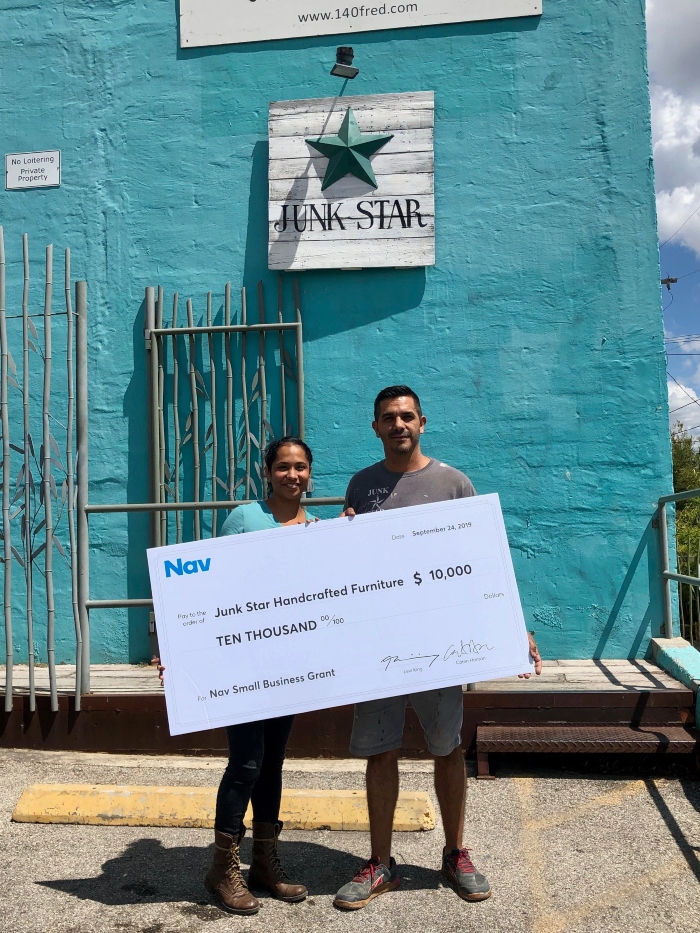
For Alex and Jenn Morton, founders and owners of Junk Stars Handcrafted Furniture in San Antonio, the small business grant they recently won practically fell into their laps — or more specifically in their email inbox. They received a “last chance to apply” email about Nav’s $10,000 quarterly Small Business Grant and decided to apply. The application process required them to share their story on social media and explain how they would use the money, if they won, to take their business to the next level.
And that was the challenge. Alex was in recovery and had recently completed two years of incarceration for a DUI that occurred a number of years before.
“We have 16,000 followers on Facebook,” Jenn explains, “and they didn’t know our story. They thought Alex was traveling.”
But they decided to go all in. Customers responded immediately to their candid description of their personal and small business struggles. “People were leaving their thoughts about how we touched their lives,” says Alex. “It was liberating. It turned something negative into something positive.”
The couple started their business from home in 2014 by turning reclaimed wood into handcrafted furniture. Demand grew sufficiently that they were able to move into a storefront location the following year. They continued to build the business, but when Alex left to serve time, Jenn had to become a carpenter in addition to business owner. The grant came at an ideal time for them, as demand for their one-of-a-kind pieces grows and they need funding to keep up.
The Mortons’ story illustrates how a grant can be more than money — though that’s certainly a big draw! It can also provide validation for the business, along with other benefits such as networking opportunities and publicity.
For most business owners, though, a grant isn’t likely to magically appear in your inbox. You’ll have to seek it out. Here’s how to start. There are three main categories of grants:
1. State and Local Grants
In many communities across the country, grants are available to businesses within a certain state or geographic area. These grants often have a goal of spurring economic development; in other words, create jobs. If you can demonstrate that the grant you receive will help your business grow to employ other people, then you may have a good shot at one of these grants.
How to find them: Local organizations providing assistance to entrepreneurs can be a helpful resource. These include your Small Business Development Center, SCORE, Women’s Business Center or Chamber of Commerce. Another valuable source of information is your local Economic Development Agency.
Tip: If you’ve never applied for a grant before, you may want to work with a small business advisor or mentor. You can find free help through the U.S. Small Business Administration (SBA).
2. Federal Government Grants
Local and state governments, as well as the federal government, offer grants for a variety of types of businesses. Here are just a few of the federal grants programs available:
- Small Business Innovation Research Program
- Small Business Technology Transfer Program
- Department of Defense, Energy, Interior and Transportation Grants
- National Institutes of Health Grants
How to find them: Grants.gov is a good place to start for information on federal grants. There, you’ll be able to search for grants and you’ll find advice on how to apply for them, among other resources.
Tip: to apply for a federal grant you’ll need a Dun & Bradstreet D-U-N-S number. It can take up to a month to be assigned one, so apply for one (for free) as soon as possible.
3. Private Grants
There are a variety of private organizations providing grants for businesses in amounts ranging from $1,000 to $250,000. Some of these are designed to help certain types of businesses, such as women or veteran-owned businesses. Others are national grants available to any business that qualifies.
How to find them: Start with an online search for “small business grants,” and then read the instructions carefully for each potential grant you identify as a potential fit.
Tip: There are paid services that help you search for grants but be careful: scams are common. Read the Federal Trade Commission’s warnings on avoiding government grant scams before you pay for grant-related services.
Make It Worth It
Researching and applying for grants takes valuable time that you could spend on other aspects of your business. So don’t neglect other aspects of your business in pursuit of free month.
But when you find those that look like a fit, apply. Even if you don’t win, the process of applying for one can be worthwhile — provided you use it as an opportunity to hone the goals and vision for your business. Sprucing up your business plan, figuring out how much money you need to grow and how you’d spend it, or creating a short “elevator pitch” for your business can help with other marketing efforts, or perhaps even help you land a small business loan.
Find a Home-Based Business to Start-Up >>> Hundreds of Business Listings.
















































